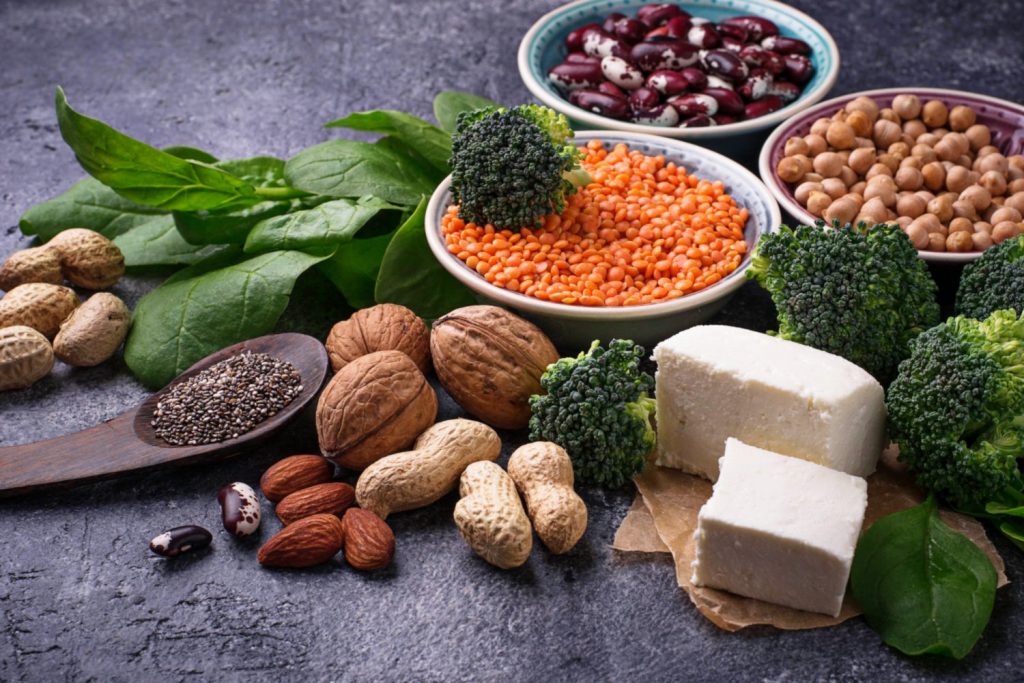Protein recommendations are all over the place. You may have heard old-school bodybuilder-types recommending 2+ grams of protein per pound of body weight per day (4.4+ grams per kg of your body weight). Others, like the USDA MyPlate platform, only recommend between 2-6.5 ounces (50-180 grams) of protein-based foods per day.
So, with all this unclear information out there, how are you to know how much protein you need? Well, let’s dive into the research and find the no-nonsense truth!
Protein Calculator
Macro Protein Calculator by WorkoutCave – Home Workouts With Minimal Space, Equipment And Time!
The Basics On Protein
Protein isn’t used by the body as the main source of fuel. Carbohydrates are used for immediate energy, and then fat stores supply the backup. Protein is used as a last resort for energy.
Instead, it is used for the repair, growth, and maintenance of body tissues. Muscle, connective tissues, skin, hair, and nails are the main uses for dietary protein.

Since it’s not a main source of energy, protein intake should be optimized for muscle growth and repair. It doesn’t have to be overconsumed, as it doesn’t offer any extra benefits after a certain threshold. The extra calories that you can consume in a day could be better used from carbohydrates and fat-based foods.
Daily Protein Recommendations
If you are here as a reader on WorkoutCave, you are an active individual. This means your protein requirements are a bit different than your sedentary counterpart.
A meta-analysis done in 2018 analyzed the effects of protein supplementation. They compared the results between groups with different total protein intakes per day. The group that showed the best response was consuming about 1.62 grams of protein per kilogram of body weight. Converting to pounds, it’s about:
0.74 grams of protein per pound of bodyweight
So, for an active person weighing 150 lbs, a daily protein intake of 111g would be optimal, with higher amounts not leading to any better results.
If you are trying to lose weight, you may find better muscle retention with higher amounts of protein. To make things easy to remember, aiming for about 0.8 grams of protein per pound of body weight every day will easily meet your protein needs.
Frequency Of Protein Intake
Now, that we know how much protein we should be consuming in a day, we need to optimize how we consume that protein.
A study in 2009 looked at the effects of varying protein intakes following resistance training sessions. It found that 20 grams of protein were enough to maximize protein synthesis, which is one of the main drivers of muscle growth and repair.

Another study done in 2016 took on this very same question. They found that 40 grams of protein following resistance training led to higher muscle protein synthesis than 20 grams. This study does note that lean body mass accrual was not different between the groups. This leads to the conclusion that somewhere between:
20-40 grams of protein per meal will maximize protein synthesis
Any more protein intake in one setting won’t provide more results. Taking that data and using it to create a meal plan allows you to divide your daily protein need into individual meals.
So that 150 lb individual we were talking about earlier can create a flexible dietary schedule:
- 37 gram of protein spread across 3 meals
- 27-28 grams of protein spread across 4 meals
- 22-23 grams of protein spread across 5 meals
Now, you can develop a flexible eating schedule with optimized protein intakes per meal. This maximizes protein synthesis throughout the day and ensures the best results possible!
The Effect Of Protein Quality
A lot of these studies are using protein sources that are readily used by the body with little-to-no waste. Many of them are analyzing the results after using whey protein.
It is well known that not all protein is created equal and some sources are more digestible than others.
Whey protein is used after workouts because it is readily digestible. It also enters the bloodstream quicker than any other protein source. On the opposite side, Casein protein digests well but takes up to 7-9 hours to fully digest. Besides digestion rates, anti-nutrient content in foods lowers protein digestibility.
This study looks at some of the impacts that these anti-nutrient compounds have on protein digestion. Some sources of protein are high in anti-nutrients and don’t digest totally. You need to raise your total protein intake to reach the levels seen in the studies mentioned earlier if you eat from these sources.
The highly digestible sources of protein are animal-based: meats, dairy, and eggs. Plant-based foods don’t allow for the same digestibility but still offer high-quality protein. This can create a higher protein need to account for the unused protein.
Research still hasn’t determined how this affects total protein intake. Looking at the available data, you can make a safe assumption on how to calculate your protein intake from all sources:
- For all animal-based protein sources, count the protein as 1:1. So, if your whey protein shake says there are 25 grams of protein per scoop, then count 25 grams to your total protein for the day.
- For all plant-based protein sources like oatmeal, count the protein as 2:1. For every gram of protein found in plant-based food, count it as 0.5 grams of protein to your total protein for the day.
While plant-based protein might be low in some amino acids in comparison to animal protein, it is known to provide a lot of health benefits and lower your risk of getting a cardiovascular disease.

Calculate How Much Protein You Need
Now, we’ve analyzed the recent data on protein. We found optimal daily protein intake, optimal protein intake per meal, and found a way to account for protein quality.
Next, we can put this all to use and calculate your daily protein requirements for optimal results!
- Weigh yourself in the morning, preferably with no clothes on, after using the restroom, and before eating food or drinking any liquids.
- Multiply that number by 0.74 if your weight is in pounds, or 1.62 if your weight is in kilograms. This is your daily protein need.
- Divide that by the number of meals you’d like to eat in a day and ensure that this number is between 20-40. If it is lower, you need to eat fewer meals. If it is higher, you should eat more meals.
- Account for protein digestibility.
- Eat like this long-term and reap the rewards!
Example
An individual wants to eat 4 meals a day and intends to get all his protein from animal-based sources.
- The individual wakes up and weighs in at 175 lbs.
- They calculate their daily protein intake to 130 grams.
- They want to eat 5 meals a day, so they find that they need 25 grams of protein per meal.
Hopefully, these examples showed you how easy this process can be.
The Takeaway
Ignore the marketing from the supplement companies and ignore the “bros” at the local gym. Optimal protein intakes have been studied and established through many studies. Use this guide to calculate your requirements. Then, you’ll see what optimal protein intake can offer you!
